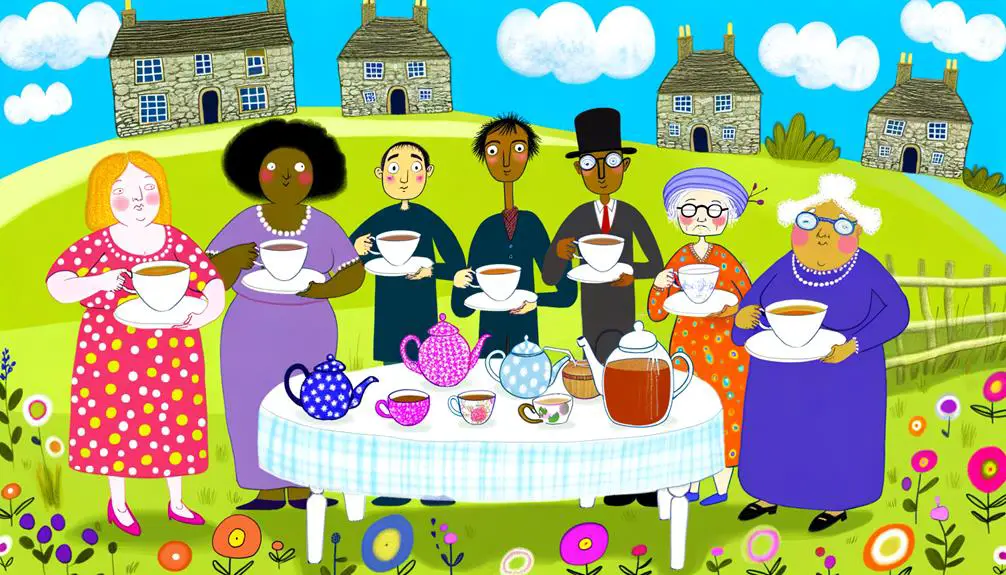In British slang, "bit" is far more complex than its literal origins of a small piece or quantity. It serves as a linguistic chameleon, subtly reflecting nuances of emotion, emphasis, and context. Its usage underscores a deep-seated cultural preference for indirectness and subtlety, adapting effortlessly across generations and settings. Whether quantifying amounts, describing relationships, or expressing quality, "bit" balances specificity with a charming ambiguity. It embodies the dynamic interplay between language and societal attitudes, evolving from Middle English to capture the essence of contemporary British life. Exploring its facets reveals layers of cultural and communicative insights.
Key Takeaways
- 'Bit' in British slang often denotes a small amount or piece of something, both tangible and abstract.
- It can express nuances of time, effort, or quality, such as 'doing my bit' meaning contributing effort.
- The term is versatile, used in various contexts like quantifying portions, describing relationships, or indicating the significance of events.
- Phrases like 'a bit on the side' or 'a bit much' highlight its role in conveying complex social nuances.
- Its usage reflects cultural preferences for subtlety and indirectness in communication, adapting to convey emotion and emphasis.
The Basics of 'Bit'

In analyzing the term 'bit' within British slang, it's imperative to grasp its multifaceted nature and how it intricately weaves into various contexts. Originating as a term that primarily denoted a small piece or part of something, 'bit' has evolved profoundly within the lexicon of British slang. Its origin explanation is deeply rooted in Middle English, deriving from Old English 'bita', which implies a bite or a morsel. This historical backdrop is essential in understanding how 'bit' has transformed from its literal meaning to a more figurative application in slang.
Comparatively, 'bit' in British slang diverges significantly from its American counterpart or other English dialects, underscoring the importance of cultural nuances in language evolution. In Britain, 'bit' can denote a specific period ('a bit' of time), a certain amount of effort ('do your bit'), or even to describe someone's role or part in a situation. This slang comparison highlights the adaptive nature of language and how regional variations can profoundly alter the meaning and usage of a term. Understanding 'bit' within this framework provides a lens through which to explore the broader dynamics of slang and its role in shaping linguistic identity.
'Bit' in Everyday Conversation
Delving into everyday conversation, you'll find that 'bit' frequently surfaces, reflecting its versatility and nuanced meaning within British vernacular. Its origins, deeply rooted in the Old English 'bita', originally denoting a piece or fragment of something, have evolved greatly. This evolution is not merely linguistic but also cultural, embedding 'bit' firmly within the tapestry of contemporary British communication.
Analyzing its cultural importance, 'bit' transcends its literal meaning to convey subtleties of emotion, emphasis, and context. It's a linguistic chameleon, adapting its significance based on tone, setting, and the relationship between the speaker and listener. This adaptability makes 'bit' a unique marker of British identity, a sign of the dynamic nature of language in reflecting societal changes and attitudes.
Furthermore, 'bit' serves as a bridge between generations, its usage spanning across age groups yet always capturing the essence of the moment. Its persistence in everyday language underscores its role not just as a word but as a cultural artifact, embodying the resilience and adaptability of British slang. Understanding 'bit' offers insight not only into the language but also into the cultural psyche, illustrating how language shapes and is shaped by the people who use it.
Expressing Quantities and Portions

In your exploration of British slang, it's vital to understand how 'bit' functions in quantifying both tangible and abstract entities. This term often denotes small, sometimes imprecise, measures and serves as a flexible reference to portion sizes. Analyzing its usage provides insight into the nuanced ways Britons communicate about quantity, highlighting a linguistic tool that balances specificity with ambiguity.
Measuring Small Amounts
When delving into the nuances of British slang, it is crucial to grasp how the term 'bit' operates as a versatile marker for measuring small amounts, reflecting both quantitative precision and cultural specificity. The importance of 'bit' goes beyond mere quantity; it contains layers of cultural nuances, providing insights into the British affinity for understatement and modesty. Employing 'bit' to describe quantities enables a form of expression that is both accurate yet adaptable, accommodating the speaker's intention to convey minimalism without resorting to exact measurements. This linguistic practice highlights a broader cultural preference for subtlety and indirectness, where the precision of quantity is often less significant than the suggestion of moderation and restraint inherent in the term 'bit'.
Portion Size References
Building on the understanding of 'bit' as a measure of small amounts, let's examine how British slang employs this term in reference to portion sizes, offering a nuanced lens through which to view expressions of quantity and portions. The term 'bit' transcends its literal meaning, becoming a bit currency in the economy of language, symbolizing both minimalism and specificity in communication about food, drink, or even time allocations. Similarly, 'bit' technology in conversational parlance reflects an evolving digital dimension, where 'a bit' can signify a small, manageable chunk of information or digital content. This usage underscores a cultural inclination towards moderation and precision, illustrating how 'a bit' serves as a linguistic tool to navigate the complexities of everyday life, quantifying experiences and substances in a manner that's both relatable and contextually rich.
Describing Time and Distance
In your exploration of British slang, understanding how 'bit' functions in the domains of time and distance reveals nuanced communication practices. You'll discover that 'bit' can signify both negligible and significant spans or lengths, contingent upon context and intonation. This linguistic flexibility offers a window into the pragmatic and adaptive nature of colloquial English usage in the UK.
"Bit" in Time Phrases
Delving into the usage of 'bit' within the context of time phrases reveals its pivotal role in articulating nuances of duration and distance in everyday British vernacular. This term, often overlooked, carries significant weight in describing temporal and spatial aspects succinctly. When you consider its application, several examples spring to mind:
- A 'bit' in sports often denotes a brief, yet critical, period where the game's outcome can hinge on mere moments.
- In technology, a 'bit' might reference the time it takes for a quick reboot or update.
- Saying you'll be "back in a bit" implies a short absence, not quantified but understood to be brief.
- Suggesting something happened "a bit ago" conveys recent past without specifying exact timelines.
These instances highlight how 'bit' serves as a versatile tool in British English, enabling speakers to convey time-related concepts with an economy of language that is both effective and culturally embedded.
Distance: A "Bit" Far
Exploring the term 'bit' further, we find its application extends beyond temporal measures, intricately weaving into the fabric of British slang to describe distances that, while not precisely defined, are universally understood to be somewhat considerable. Delving into 'bit's origin reveals its versatility, originally denoting smaller components of a whole, which intriguingly aligns with its usage in quantifying distances in an ambiguous, yet contextually rich manner. This semantic expansion reflects cultural interpretations, where the elasticity of 'bit' accommodates a spectrum of distances, subtly influenced by regional dialects within the UK. Such variations underscore the term's fluidity, embodying a uniquely British penchant for understatement and linguistic economy. The term's adaptability in conveying distances, thus, showcases its embeddedness in the nuances of British communication.
Estimating With "Bits"
When considering how 'bit' functions in British slang to estimate time and distance, it is important to recognize its role as a linguistic tool that bridges the gap between precision and ambiguity, offering insights into cultural attitudes towards measurement and estimation. Unlike bit pricing or digital bits, which demand exactitude, the use of 'bit' in this situation reflects a more relaxed approach:
- It suggests a degree of imprecision acceptable in everyday conversation.
- Conveys an understanding that exact measures are often unnecessary.
- Encourages a focus on the general idea rather than the specifics.
- Highlights a cultural preference for ease and fluid communication over rigid accuracy.
This usage of 'bit' underscores a broader cultural comfort with estimations, prioritizing effective communication over the precision found in digital bits or bit pricing.
'Bit' in Relationships and Roles
In British slang, 'bit' often denotes an individual's role or position within a relationship, subtly reflecting underlying dynamics and expectations. This usage navigates through nuances of 'bit' etiquette, illuminating how cultural perception shapes the interpretation of one's place or function in various social or intimate connections. You'll find that in the UK, invoking 'my bit' or 'your bit' in conversations about relationships doesn't merely identify a person but encapsulates their essence, responsibilities, and the nature of their involvement.
Delving deeper, the application of 'bit' in this scenario serves as a linguistic mirror to societal norms and values. It's a compact expression that, while seemingly casual, is laden with implications about the balance of power, emotional investment, and the unspoken contracts that govern human interactions. For instance, referring to someone as 'a bit on the side' conveys not just an extramarital affair but also a hierarchy of emotional or physical preference that might not be openly acknowledged.
Understanding this, you're equipped to decode the layers of meaning embedded in seemingly simplistic slang. 'Bit' etiquette in relationships and roles, hence becomes a fascinating lens through which the intricacies of British cultural perception can be explored, revealing much about the complexities of human connections.
Suggesting Effort or Involvement

You'll find that 'bit' extends beyond mere roles, subtly indicating the depth of one's effort or involvement in a given context. This nuanced usage underscores both physical exertion and emotional involvement, showcasing the term's flexibility in capturing the essence of participation and engagement.
In analyzing this aspect of British slang, consider the following points:
- The phrase "doing my bit" often signifies contributing effort towards a collective goal, emphasizing a personal commitment that involves both physical and emotional investment.
- Expressions such as "a bit much" can hint at the overwhelming nature of an endeavor, suggesting an excessive demand on one's physical or emotional resources.
- The term "bit part" minimizes the role's significance but can also subtly acknowledge the effort required to contribute, even in a small way, to a larger project.
- Saying someone "wants a bit of" something implies a desire for involvement or participation that goes beyond surface-level interest, hinting at a deeper emotional engagement.
Through these examples, it's clear that 'bit' serves as a linguistic tool for articulating degrees of involvement, ranging from minimal participation to significant effort, encompassing both physical exertion and emotional involvement.
Highlighting Quality or State
Shifting focus from the dimension of effort and involvement, it's important to explore how 'bit' also adeptly captures nuances in quality or state, serving as a versatile marker in British slang. Delving into bit's origin reveals its journey from a literal fraction or piece to a linguistic tool that nuances expression, particularly in the domain of quality or state. When you say something is 'a bit good,' you're not merely quantifying goodness; you're subtly downplaying or modulating the intensity of the quality being described. This nuanced usage is a demonstration of the elasticity of 'bit' in colloquial speech.
In a slang comparison, while other vernaculars might use entirely different words or phrases to express slight variations in quality or state, British slang leans on 'bit' to do heavy lifting. This reliance on a single term for a spectrum of meanings highlights the linguistic efficiency and creativity embedded in British vernacular. It's a linguistic shorthand that packs a punch, conveying a range of sentiments from mild approval to understated disappointment without the need for lengthy explanations. Understanding this aspect of 'bit' enriches one's appreciation for the subtleties of British slang, showcasing its capacity to convey complex attitudes and evaluations succinctly.
'Bit' in Phrases and Idioms

Exploring the domain of British slang, it's clear that 'bit' plays an essential role in various phrases and idioms, showcasing a diverse tapestry of cultural meanings and social nuances. The term 'bit,' with its rich historical lineage, permeates the lexicon, reflecting both the evolution of language and the intricacies of cultural identity. This exploration reveals not only the adaptability of 'bit' but also its capacity to convey nuanced expressions of time, quality, and relation.
- 'Do a bit': This phrase, often implying involvement in an activity or a task, showcases 'bit' in the context of action or participation. It highlights the term's utility in denoting engagement, however transient or minor.
- 'A bit much': Here, 'bit' escalates or intensifies the sentiment, suggesting that something is excessive or overbearing. This usage underscores the flexibility of 'bit' in qualitative assessments.
- 'Bit on the side': Reflecting on cultural variations, this idiom touches on the themes of secrecy and infidelity, revealing 'bit's' role in describing relationships outside the primary commitment.
- 'A bit of a do': Illustrating 'bit' origins in social contexts, this phrase conveys the significance of an event or gathering, often with a hint of irony or understatement.
Through these examples, it's evident that 'bit' serves as a linguistic prism, refracting various shades of meaning across the spectrum of British colloquial speech.
The Evolution of 'Bit' in Slang
The linguistic journey of 'bit' in British slang illustrates a fascinating evolution, where it has morphed from simple quantifiers to embody complex social and emotional nuances. You'll find that the 'bit' origins, deeply rooted in Middle English, initially served to denote small pieces or fragments. This foundational meaning paved the way for its adoption into the vernacular, where it began to take on more abstract connotations.
| Era | Usage of 'Bit' |
|---|---|
| 16th Century | Quantitative measure (e.g., "a bit of bread") |
| 19th Century | Monetary value (e.g., "two-bit") |
| Early 20th Century | Descriptive slang (e.g., "a bit much") |
| Contemporary | Emotive expression (e.g., "feeling a bit down") |
This table showcases the adaptability of 'bit', highlighting its cultural impact through the ages. Each transformation reflects shifts in societal values and attitudes, with 'bit' becoming a mirror to the changing linguistic landscape. Its evolution from a tangible measure to an expression of emotion underscores the dynamic nature of slang, where words are not just tools for communication but also carriers of rich cultural narratives.







